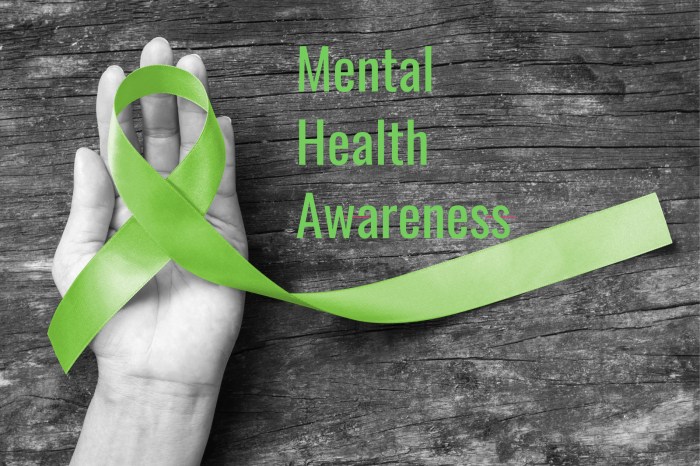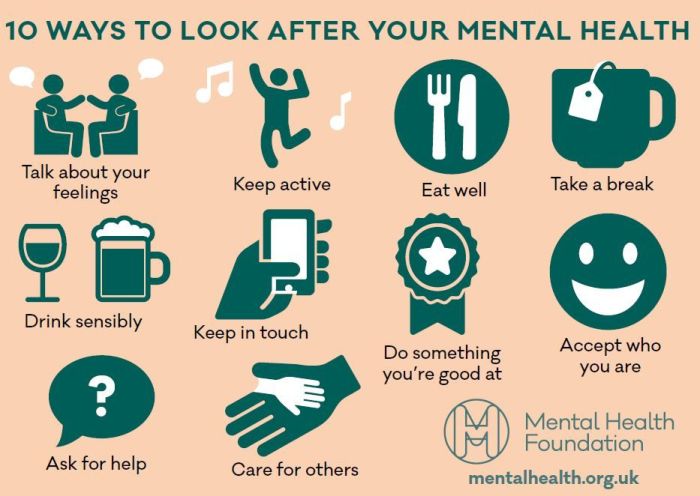Mental Health Awareness takes center stage, inviting readers into a world of understanding and compassion. Get ready to dive deep into the realm of mental well-being.
From breaking down stigmas to exploring workplace initiatives, this topic delves into the importance of mental health awareness in our society.
Overview of Mental Health Awareness
Promoting mental health awareness is crucial in breaking the stigma surrounding mental health issues and encouraging individuals to seek help when needed. By raising awareness, we can educate society about the importance of mental well-being and reduce discrimination against those struggling with mental health conditions.
Initiatives and Campaigns
- One example of a successful mental health awareness campaign is “Bell Let’s Talk” in Canada, which aims to reduce the stigma around mental health by promoting open conversations and raising funds for mental health initiatives.
- The “It’s Okay to Not Be Okay” campaign in the United States focuses on normalizing discussions about mental health struggles and providing resources for those in need of support.
- The World Health Organization’s “Depression: Let’s Talk” initiative seeks to increase awareness about depression and encourage individuals to seek help through various communication channels.
Impact on Society and Individuals
Increasing mental health awareness can lead to a more supportive and understanding society where individuals feel comfortable seeking help for their mental health issues. By destigmatizing mental health conditions, we can create a more inclusive environment that prioritizes mental well-being.
Stigma Surrounding Mental Health: Mental Health Awareness

The stigma surrounding mental health is a pervasive issue that can prevent individuals from seeking the help they need. This stigma can lead to discrimination, isolation, and a lack of understanding about mental health conditions.
Common Stigmas Associated with Mental Health
- People with mental health issues are weak or lazy.
- Mental health problems are a sign of personal failure.
- Seeking help for mental health is a sign of weakness.
- Mental health issues are not real illnesses.
How Stigma Affects Individuals Seeking Help, Mental Health Awareness
- Individuals may feel ashamed or embarrassed to talk about their struggles.
- Fear of judgment or discrimination can prevent people from seeking treatment.
- Stigma can lead to self-isolation and a reluctance to open up about mental health.
Strategies to Reduce Stigma Related to Mental Health
- Education and awareness campaigns to promote understanding of mental health conditions.
- Encouraging open conversations about mental health to break down stereotypes.
- Supporting individuals who speak out about their mental health experiences.
- Challenging negative stereotypes and myths about mental health through advocacy and activism.
Mental Health Awareness in the Workplace

Promoting mental health awareness in work settings is crucial for creating a supportive and healthy environment for employees. By raising awareness about mental health issues, companies can help reduce stigma, increase understanding, and provide resources for those who may be struggling.
Importance of Workplace Mental Health Programs
- Employee well-being: Workplace mental health programs can improve the overall well-being of employees by providing resources for coping with stress, anxiety, and other mental health challenges.
- Productivity: Addressing mental health in the workplace can lead to increased productivity as employees feel supported and are better able to manage their mental health.
- Retention: Companies that prioritize mental health are more likely to retain employees as they feel valued and supported in their mental health journeys.
Examples of Workplace Mental Health Programs
- Employee Assistance Programs (EAPs): EAPs offer confidential counseling and support services to employees dealing with mental health issues.
- Mental Health First Aid Training: Providing employees with training on how to recognize and respond to mental health crises can be beneficial for creating a supportive workplace environment.
- Flexible Work Arrangements: Offering flexible work schedules or remote work options can help employees better manage their mental health by reducing stress and promoting work-life balance.
Benefits of Addressing Mental Health in the Workplace
- Improved Morale: Employees are more likely to feel valued and supported when mental health is prioritized in the workplace, leading to increased morale and job satisfaction.
- Reduced Absenteeism: By addressing mental health issues proactively, companies can reduce absenteeism related to mental health challenges and create a more engaged workforce.
- Cost Savings: Investing in mental health programs can result in cost savings for employers by reducing turnover, absenteeism, and healthcare costs related to mental health issues.
Resources for Mental Health Support
In times of need, it’s essential to know where to turn for support. There are various resources available for individuals struggling with mental health issues, ranging from hotlines to support groups and online platforms. These resources play a crucial role in providing assistance to those in need.
Hotlines
Hotlines are a valuable resource for individuals in crisis or needing immediate help. They provide a confidential and supportive environment where trained professionals can offer guidance, assistance, and a listening ear to those in distress.
Support Groups
Support groups offer a sense of community and understanding to individuals facing mental health challenges. By connecting with others who share similar experiences, individuals can feel less alone and gain valuable insights, coping strategies, and emotional support.
Online Platforms
Online platforms have become increasingly popular for mental health support, offering a wide range of resources, information, and tools. From mental health websites to virtual therapy sessions, these platforms provide convenient access to support and guidance from the comfort of one’s home.
Tips for Accessing and Utilizing Mental Health Resources
– Research and identify reputable resources that align with your specific needs and preferences.
– Reach out to trusted individuals or professionals for recommendations on reliable mental health resources.
– Utilize multiple resources to create a well-rounded support system tailored to your individual needs.
– Stay proactive in seeking help and don’t hesitate to reach out for support when needed.

